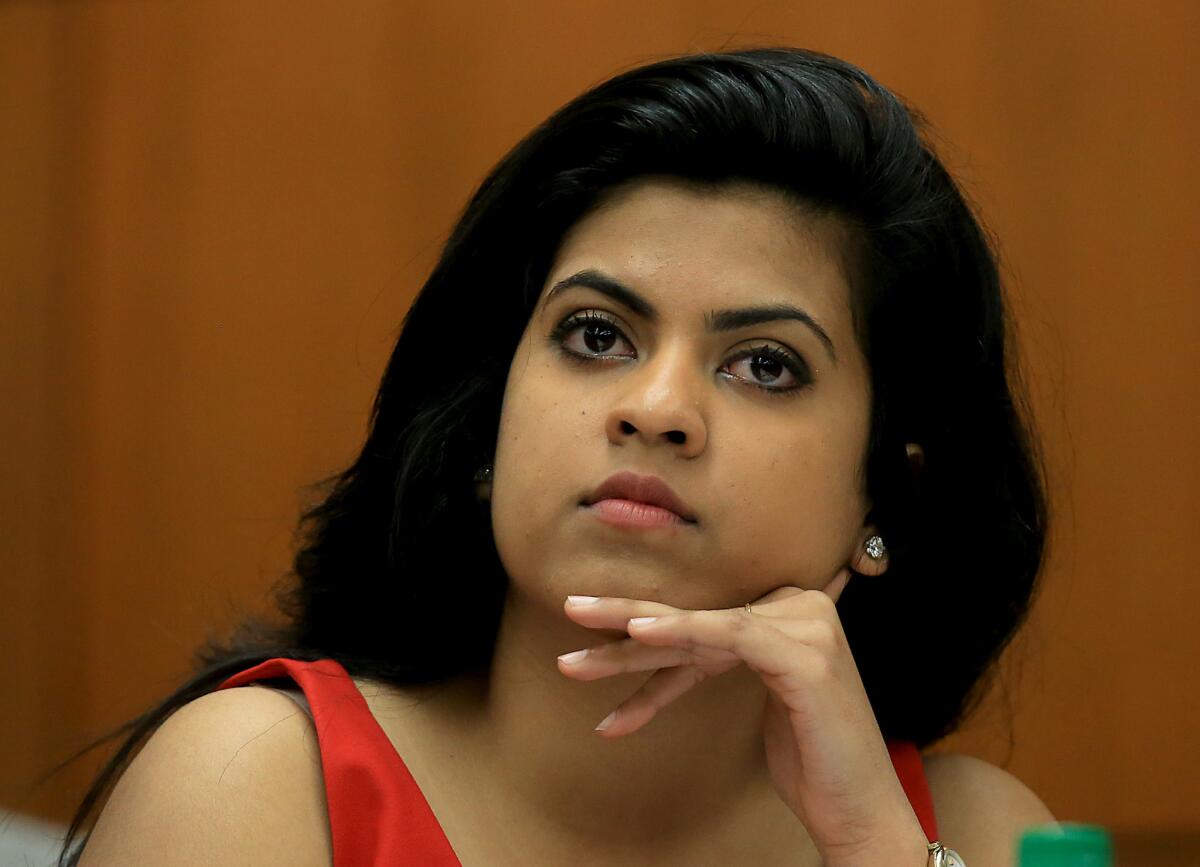Racial slur against USC student leader sparks campus debate

Rini Sampath, USC’s student body president who was recently taunted with a racial slur, said she hopes the incident will spark a national conversation about race relations on campus.
Lola Fajinmi and Precious Nwaoha were both A students in high school. But once they got to USC, the African American women were repeatedly asked if they were athletes and told they probably got in because of affirmative action.
So when they heard that a USC fraternity member had cursed the school’s student body president, Rini Sampath, with a racial slur and thrown a drink at her last weekend, they said they were appalled but not too surprised.
“It’s something that happens so often you kind of just tune it out,” Fajinmi said of racial bias, as she paused between classes on campus Wednesday. “I think it’s a huge deal and would like the administration to do something about it. This is a hard topic, but we need to start talking about it.”
See the most-read stories this hour >>
That’s exactly what Sampath said she hopes the incident will launch: candid conversations about campus race relations and a chance for students like Fajinmi and Nwaoha to share their experiences.
“This story is really not about me,” Sampath, a 21-year-old senior of Indian descent, said in an interview Wednesday. “It’s about what the greater community goes through on a daily basis. I hope this creates a national conversation about race relations on campus, because these kinds of things don’t just happen at USC.”
Since Sampath wrote about the incident on Facebook on Sunday, she said, she has received thousands of supportive messages from as far away as India and Denmark. Her post received 8,800 likes by Wednesday afternoon and had been shared by such luminaries as Pulitzer Prize-winning author and MIT professor Junot Diaz. But she said some have defended the slur as free speech, while others have argued the incident should have been handled quietly.
There was plenty of buzz about the incident on campus, where students gathered at the outdoor campus center courtyard for lunch, perused produce at a farmer’s market and lounged around the iconic Tommy Trojan statue. Nearly all students seemed to know about the incident because it burned up social media sites and prompted USC officials to distribute a campuswide letter late Tuesday expressing “sadness, anger and dismay.”
The USC Interfraternity Council also issued a statement condemning the actions, standing “in solidarity with Rini” and other victims of bias and supporting the unnamed fraternity’s decision to suspend the offending student’s membership and eject him from the chapter house.
Some students said they had never experienced racism and found USC to be a diverse and welcoming environment. Officials have worked to increase campus diversity over time; its 2014 student body was 33% white, 18% Asian, 12% Latino and 5% African American, with the rest international students or other ethnicities.
Daniel Uhm, a 21-year-old senior of Korean descent and member of a multicultural Christian fraternity near Greek Row, said he regarded Sampath’s experience as an isolated incident of racism.
“I’ve never experienced racism in my fraternity or outside,” Uhm said. “For the most part, this campus is welcoming of different races and cultures.”
At the El Centro Chicano Center in the student union building, Latino students said they had witnessed or experienced “microaggression” — incidents that were not overtly hostile but still offensive. Juan Martinez, a 20-year-old civil engineering major of Mexican heritage, said he was told by a white acquaintance that his multicultural fraternity, Sigma Delta Alpha, was not a “real fraternity,” implying that diverse Greek organizations were inferior to those that are predominantly white.
Kyron Richard, a 21-year-old economics major who is gay and African American, also said microaggression was more prevalent than overt racism at USC. He said some of his white friends have made racially insensitive remarks without realizing it, such as girls viewing black men as second-choice “consolation prizes” when rejected by whites.
But Richard, like some of the other minority students interviewed, said he was often reluctant to share his feelings of discomfort with friends. “You don’t want to be the person who is constantly telling people what they should and should not say,” he said.
Sampath said the weekend incident brought back “a flood of memories” of racism in her life. The daughter of immigrants who was raised in India, Singapore, Arizona and the Bay Area before moving to Irvine, Sampath said white girls would tell her she could not play with them because of her skin color. When she ran for USC student body president this year, she said, racist messages were posted on social media: “A vote for Rini is a vote for Al-Qaeda.”
She said she hoped the incident would embolden students to speak out against racism and galvanize action from administrators to improve the campus climate. Some ideas, she said, include a staff member dedicated to diversity issues, more funding for ethnic student organizations and diversity training. She and other campus leaders plan to hold a forum on cultural diversity next week to give students a chance to share their ideas and experiences.
“My intention of making this public plea is so we can move forward, come up with solutions and come together as a community,” she said.
Twitter: @TeresaWatanabe
ALSO:
All the ‘Happy Birthday’ song copyright claims are invalid, federal judge rules
Transgender woman says TSA detained, humiliated her over body ‘anomaly’
Donald Trump boycotts Fox News Channel after O’Reilly cancellation
More to Read
Sign up for Essential California
The most important California stories and recommendations in your inbox every morning.
You may occasionally receive promotional content from the Los Angeles Times.











